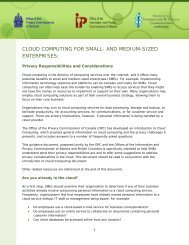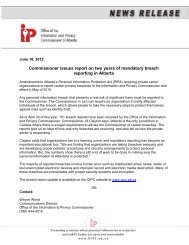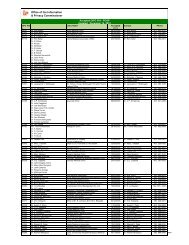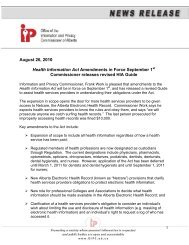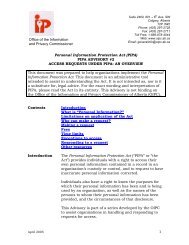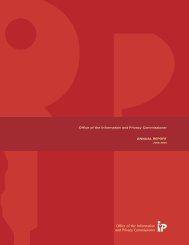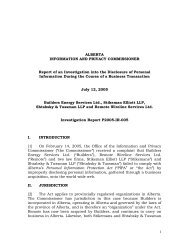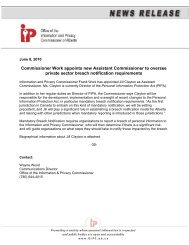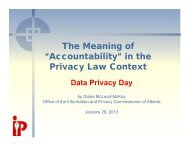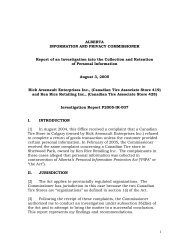Personal Information Protection Act - Office of the Information and ...
Personal Information Protection Act - Office of the Information and ...
Personal Information Protection Act - Office of the Information and ...
You also want an ePaper? Increase the reach of your titles
YUMPU automatically turns print PDFs into web optimized ePapers that Google loves.
A G u i d e f o r B u s i n e s s e s a n d O r g a n i z a t i o n s o n t h e P e r s o n a l I n f o r m a t i o n P r o t e c t i o n A c t<br />
d. If <strong>the</strong> use is reasonable for <strong>the</strong> purposes <strong>of</strong> an investigation or legal proceeding<br />
EXAMPLE: An insurer can use information about an insurance claimant’s financial history<br />
to investigate suspected fraudulent activity.<br />
e. If <strong>the</strong> personal information is publicly available as defined in <strong>the</strong> PIPA Regulation<br />
EXAMPLE: A company can use information obtained from a l<strong>and</strong> title search when determining<br />
whe<strong>the</strong>r to purchase property.<br />
f. If <strong>the</strong> information is necessary to decide whe<strong>the</strong>r an individual is suitable for an honour,<br />
award or o<strong>the</strong>r similar benefit, including an honorary degree, scholarship or bursary (but<br />
not for a job or a promotion)<br />
EXAMPLE: A Chamber <strong>of</strong> Commerce may use biographical information in its files to provide<br />
an achievement award to a member.<br />
g. If a credit reporting agency uses personal information to create a credit report, <strong>and</strong><br />
<strong>the</strong> individual has told <strong>the</strong> organization that originally collected <strong>the</strong> information that<br />
<strong>the</strong> organization may disclose that information to <strong>the</strong> credit reporting agency<br />
EXAMPLE: A credit reporting agency can create a credit report for a department store, at<br />
<strong>the</strong> request <strong>of</strong> a customer who is applying for a store credit card.<br />
h. If, under <strong>the</strong> disclosure section <strong>of</strong> PIPA (section 20), an organization can disclose <strong>the</strong><br />
information to your organization without consent<br />
EXAMPLE: The owner <strong>of</strong> a campground can use <strong>the</strong> name <strong>of</strong> an injured hiker disclosed<br />
by an Adventure Hiking tour guide to locate <strong>the</strong> hiker’s family members also camping on<br />
<strong>the</strong> grounds, <strong>and</strong> inform <strong>the</strong>m <strong>of</strong> <strong>the</strong> incident (disclosure under section 20(h)).<br />
i. If your organization uses <strong>the</strong> information to respond to an emergency that threatens<br />
<strong>the</strong> life, health or security <strong>of</strong> an individual or <strong>the</strong> public<br />
EXAMPLE: A patron <strong>of</strong> a recreational facility makes a threat against a facility employee on<br />
a customer satisfaction form. The facility can use <strong>the</strong> patron’s information to prevent <strong>the</strong><br />
employee from being injured.<br />
j. If your organization needs <strong>the</strong> information to collect a debt or to repay <strong>the</strong> individual money<br />
EXAMPLE: A company can use an individual’s address to collect a debt.<br />
k. If <strong>the</strong> organization using <strong>the</strong> information is an archival institution <strong>and</strong> <strong>the</strong> use is reasonable<br />
for archival purposes or research<br />
EXAMPLE: An archive may use <strong>the</strong> personal information in documents to decide how to<br />
organize <strong>the</strong>m.<br />
l. If <strong>the</strong> use meets <strong>the</strong> requirements for archival purposes set out in <strong>the</strong> PIPA Regulation<br />
<strong>and</strong> it is not reasonable to obtain <strong>the</strong> individual’s consent. Archival purposes is defined<br />
in <strong>the</strong> PIPA Regulation<br />
EXAMPLE: An organization can prepare records containing personal information for an<br />
appraisal to decide whe<strong>the</strong>r <strong>the</strong> records should be permanently preserved.<br />
30<br />
Service Alberta <strong>and</strong> <strong>the</strong> <strong>Office</strong> <strong>of</strong> <strong>the</strong> <strong>Information</strong> <strong>and</strong> Privacy Commissioner



